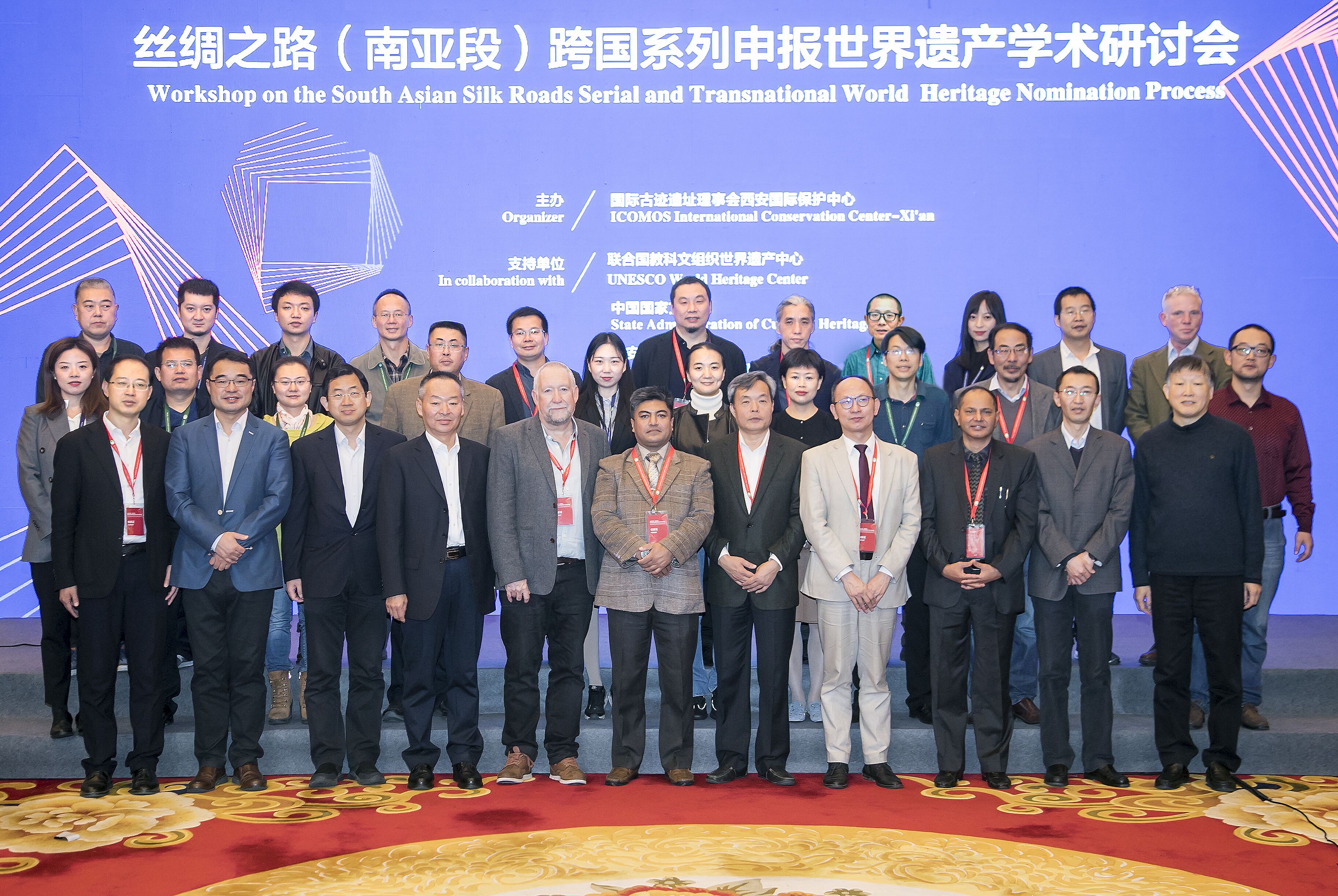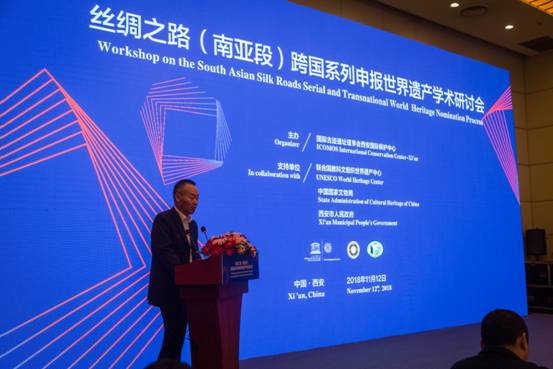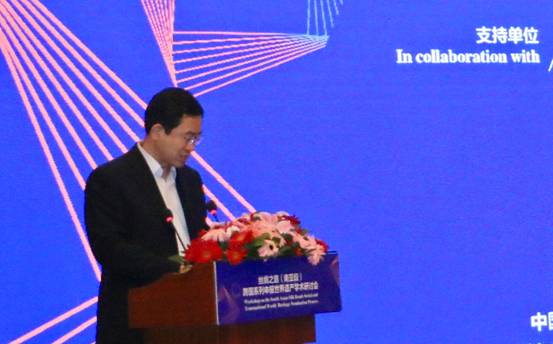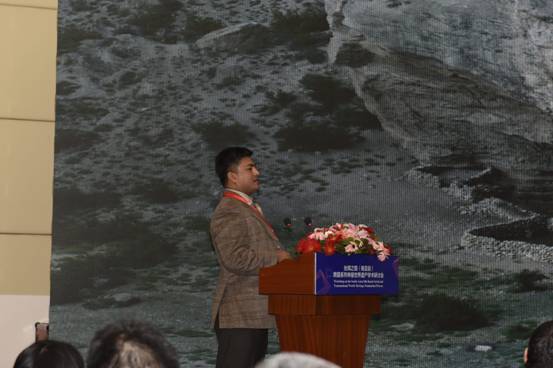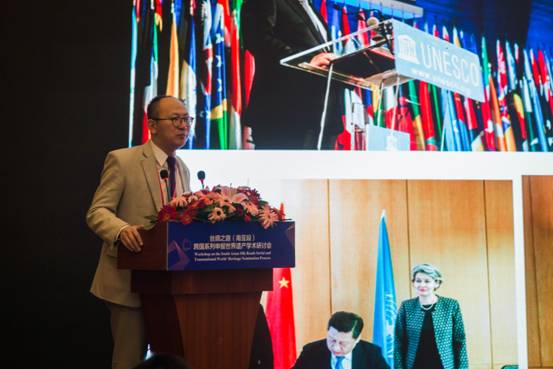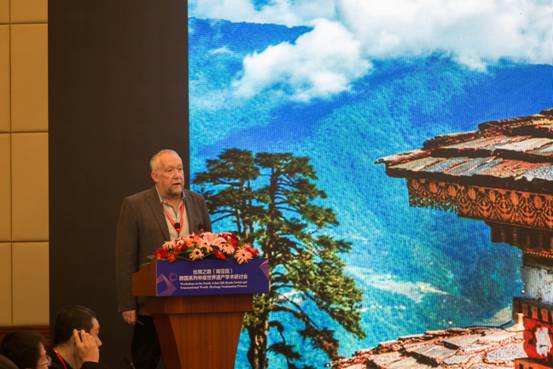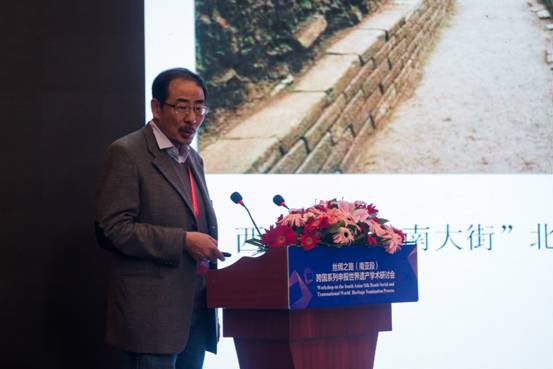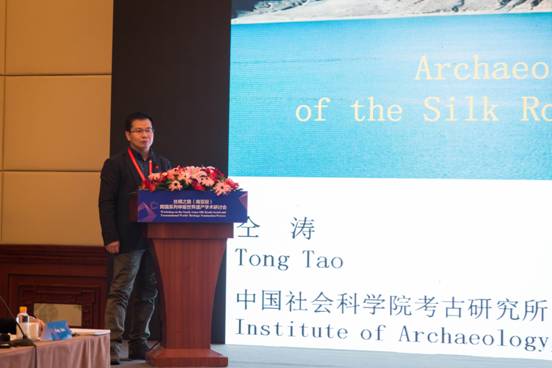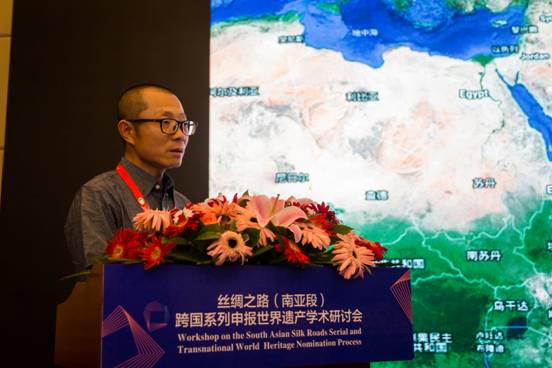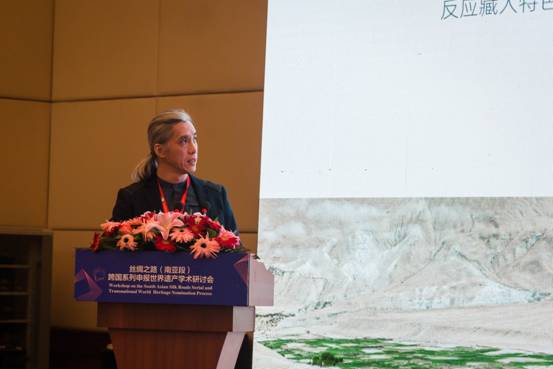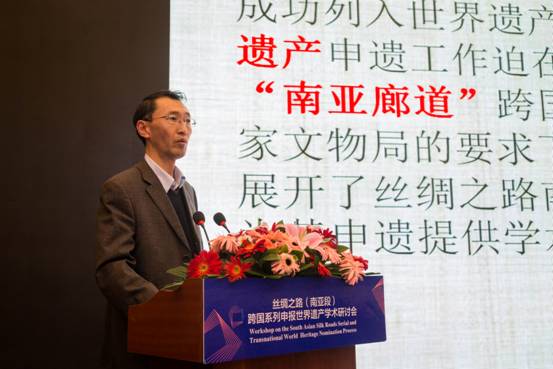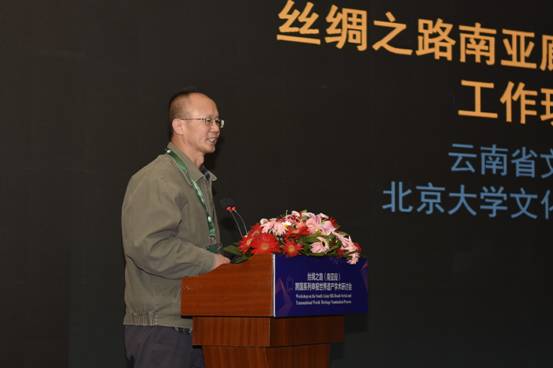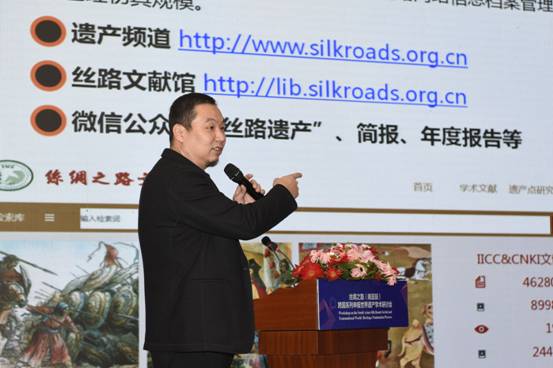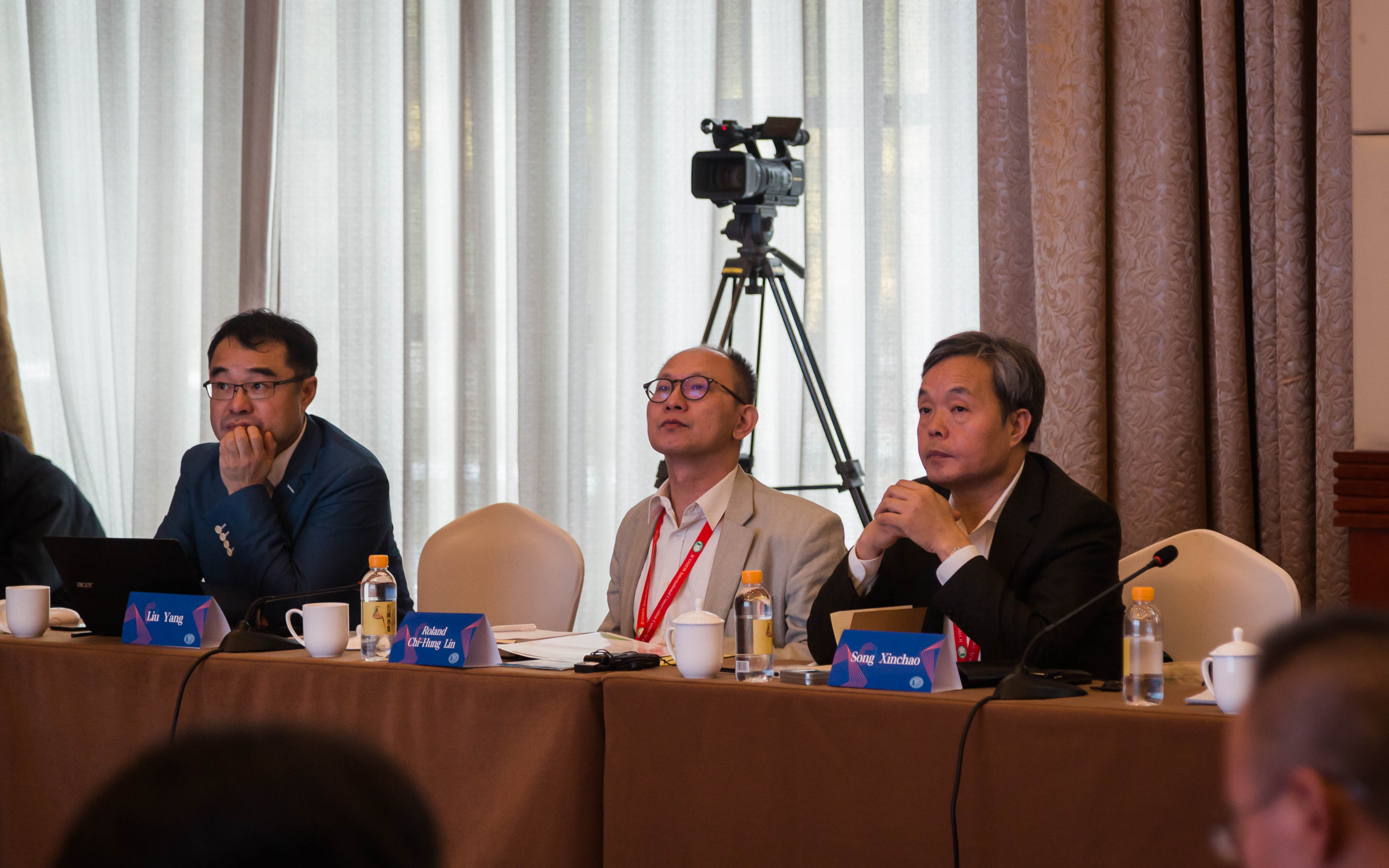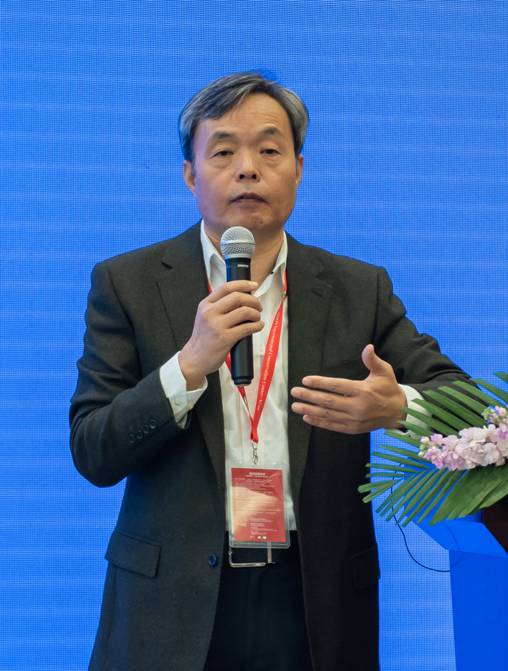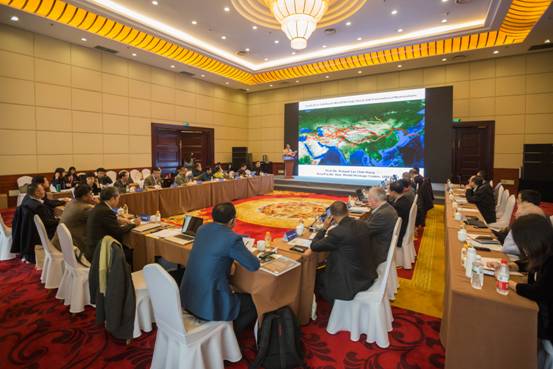Silkroads News
The Workshop on the South Asian Silk Roads Serial and Transnational World Heritage Nomination Process Held in Xi’an The Workshop on the South Asian Silk Roads Serial and Transnational World Heritage Nomination Process
The Workshop on the South Asian Silk Roads Serial and Transnational World Heritage Nomination Process Held in Xi’an
The Workshop on the South Asian Silk Roads Serial and Transnational World Heritage Nomination Process was successfully held in Xi’an on 12th November, 2018.
Group photo of representatives (Credit:IICC-X)
The workshop was organised by IICC-X, as the continuation of the 2017 Workshop on the South Asian Silk Roads Serial and Transnational World Heritage Nomination Process. It was in collaboration with UNESCO World Heritage Center, the State Administration of Cultural Heritage of China, as well as Xi'an Municipal People's Government, Shaanxi and Xi'an Administration of Cultural Heritage. On the background of the seven consensus formed at the workshop last year, all relevant parties exchanged views on the selection of the properties of the countries along the South Asia section of the Silk Roads, dicussed the corridor OUV, the status of conservation and management, and the laws and regulations, in preparation of the nomination process. The delegates developed a draft agreement on the next phase of the South Asian Silk Roads Serial and Transnational World Heritage Nomination Process, the final version will be published on website of UNESCO WHC.
More than 40 participants, including Dr.Roland Chi-Hung Lin, specialist of UNESCO WHC, Prof.Timothy Williams, Reader of UCL London, Mr.Suresh Sula Shresta, principal of World Heritage Conservation Department of Nepal Archaeology Administration, Mr. Song Xinchao, Deputy Director of the State Administration of Cultural Heritage of China, as well as the delegates from 5 provinces (Shaanxi, Sichuan, Yunnan, Qinghai and Tibet) along the South Asian Silk Roads in China, and universities and academic institutes participanted in the workshop and gave speeches.
In his speech, Mr. Zhou Kuiying, Deputy Director of
the Shaanxi Provincial Cultural Heritage Administration, expressed his thanks
to the organizers of the ICOMOS International Conservation Center-Xi’an, the
supporters of the UNESCO World Heritage Center, State Administration of
Cultural Heritage of China, and Xi'an People's Government. He expressed the
willingness of the Shaanxi Provincial Cultural Heritage Administration to
continue to increase cooperation with the heritage sites, professional
institutions and experts along the Silk Road, and to put the South Asian
section of the Silk Road on the World Heritage List at an early date through
joint efforts by all parties.
Wang Wei, Deputy Secretary General of Xi'an
government, expressed his gratitude for choosing Xi'an again as the venue for
holding this workshop. On the basis of reviewing the achievements of the South
Asian Silk Road Symposium last year, he stressed the important relationship
between the Silk Road and Xi'an. In 2019, on the fifth anniversary of the
successful declaration of the Silk Roads: the Routes Network of
Chang'an-Tianshan Corridor as the World Heritage, Mr. Wang Wei was looking
forward to promoting the intellectual support and technical assistance in the
protection and declaration of the cultural heritage of the Silk Road through
the international and domestic colleagues with the platform of IICC, which can
carry forward the cultural spirit of South Asia, strengthen the people's hearts
and the all-round exchanges and cooperation between the countries along the
Silk Road.
Suresh Sura Shresta, Head of the Department of World
Heritage Protection of the Nepalese Archaeological Bureau and the World
Heritage Project Nomination of the Nepal Silk Road, first reviewed the history
of Nepal’s participation in the Silk Roads Serial and
Transnational World Heritage Nomination Process, and introduced the
achievements of the protection and declaration of Silk Road cultural heritage. Mr.
Shresta elaborated on the basic situation of the South Asian Silk Road Corridor
in Nepal, focusing on the rock paintings of the remains of the ancient city and
the remains of the irrigation system of the Lumbini-Mustang Corridor. At the
same time, Mr. Shresta demonstrated the public education and publicity work on
the protection of the Silk Road heritage in the country, as well as a series of
interactive achievements aimed at the indigenous people of the heritage site.
Mr. Roland Chi-Hung Lin, Commissioner of the UNESCO
World Heritage Centre, spoke of UNESCO's initiative to launch the “Path of Dialogue” scientific expedition in
the late 1980s, reviewing UNESCO's important nodes in promoting the Silk Road
research, conservation and World Heritage nomination process, introducing the
specific conditions and the nomination strategy of the Silk Road from the whole
route to the corridors in the South Asian section. He hoped that countries
along the South Asian Silk Road can actively communicate and cooperate on many
aspects such as laws and regulations, scientific research and heritage
monitoring. Mr. Lin has repeatedly emphasized the important position and role
of IICC-X in the cross-border coordination, protection management and heritage nomination.
He also expected that IICC-X can give full play to the liaison and coordination
functions of the transnational secretariats, continue to promote the work of
the South Asian section of the Silk Road to achieve more results under the
guidance of the State Administration of Cultural Heritage of China, Shaanxi Provincial
Cultural Heritage Administration, Xi'an People's Government, and expected more
countries to join the nomination project.
Tim Williams, senior professor at the School of
Archaeology of University College London, introduced the latest developments in
the protection and research of the South Asian section of the Silk Road. He was
very fortunate to see that all parties were making unremitting efforts in this
direction and creating encouraging results. Based on the special study of the
South Asian Corridor, Professor Williams proposed a declaration strategy,
analyzed the selection method of the heritage sites, and emphasized the
importance of the database. He also said that he was willing to carry out
deeper cooperation with international and Chinese professional organizations,
especially cooperation with IICC-X in the construction of the Silk Road
database.
Professor Zhang Jianlin, researcher at the Shaanxi
Provincial Institute of Archaeology, introduced the progress of the protection
of sites along the Silk Road in South Asia, East Asia and several parts of
China. He used a large number of pictures to illustrate the status of the
display and interpretation of the sites along the Silk Road and analyzed the
restoration and display method of different types of sites, providing a rich
case study of protection display.
Professor Tong Tao, associate researcher at the
Institute of Archaeology of the Chinese Academy of Social Sciences, restored a
real Tang-Tibet ancient Road and the important role that this line played on
the Silk Road in the Qinghai-Tibet Plateau, through combing a lot of historical
materials provided by Wang Xuance and
Xuanzang.
In the afternoon, Professor Chen Ling from the School of Archaeology and Museology
of Peking University first gave a speech. He started from the geography and
space, introduced the geographical space of the culture, the impact on the
human race and other aspects, and proposed the difference between the South
Asian corridor and the Tianshan Corridor in the grassland area, emphasizing the
relationships of the Maritime Silk Road and the South Asian Corridor.
Professor He Jie from the School of Architecture of
Tianjin University introduced the work on remote sensing and record analysis of
cultural landscapes in Lumbini-Mustang section and Luo City in Nepal, showing a
lot of work done by the team in just 10 days, and the fruitful results.
Niu Jun, Director of the Cultural Heritage of
Qinghai Province, Min Rui, Director of the Yunnan Institute of Cultural Relics
and Archaeology, Ms. Wan Jiao, Assistant to the Dean of the Sichuan Provincial
Institute of Cultural Relics and Archaeology, and Gao Feng, Deputy Director of
the Department of Museology of Tibet Cultural Heritage Bureau, respectively
introduced the recent archaeological
investigations, records and protections for the heritages of the South Asian
Silk Road in Qinghai, Yunnan, Sichuan and Tibet, and presented a series of new
discoveries that had great significance by providing physical evidence for the
study of South Asian Silk Road.
Professor Feng Jian, Vice Director of IICC-X first thanked
UNESCO, ICOMOS, State Administration of Cultural Heritage of China, Shaanxi
Provincial Cultural Heritage Administration and Xi'an Municipal Government for
their strong support and guidance to all aspects of IICC-X. He demonstrated the
construction and recent achievements of the IICC-X Silk Road archives
information management platform to the participating experts, focusing on the
construction of the IICC cultural heritage database in the South Asian section
of the Silk Road since the South Asia Conference in 2017, and stated that it
will continue to work closely with the School of Archaeology of University
College London to speed up the process of data sharing and data
standardization, promote the construction of the database in the South Asia
section, and lay the file foundation for the protection, research and
declaration of the South Asian section of the Silk Road.
In the following session, chaired by Roland Chi-Hung
Lin, the participants discussed and unanimously adopted the “South Asian Silk Roads Serial and Transnational World Heritage
Nomination Process Consensus Draft (2018-2019)”. The
final version of the draft will be published on the official website of the
UNESCO World Heritage Centre in the near future.
At the end of the meeting, Mr. Song Xinchao, Deputy
Director General of the State Administration of Cultural Heritage of China and
Chairman of ICOMOS China, made a summary of the meeting. He reviewed and
summarized the speeches of the experts in detail, stressing that the work of
the South Asian nomination was
inseparable from the support of countries along the Silk Road and welcomed the
participation of India, Bhutan, Bangladesh, Pakistan, Myanmar and other
countries. Song Xinchao asked all museology units and related institutions in
the country to further strengthen the investigation, research, planning and
publicity of the heritage sites in South Asian section, and explore the value
attributes of each site and the outstanding universal value of related
corridors. He also pointed out the importance of the database platform
construction, and requested IICC-X to cooperate with University College London in
depth, improve the database construction, and consider signing MOU with the
provinces along the line to provide archival data support for the next
application.
Mr. Damodar Gautam, Head of the Planning and Evaluation Department of the Nepal Archaeological Bureau, Liu Yang, Deputy Director of the World Heritage Department of the State Administration of Cultural Heritage of China, Xiao Li, Director of the World Heritage Department, Li Gang, Deputy Director of the Cultural Heritage Department of the Shaanxi Provincial Cultural Heritage Administration, Ma Rui, Director of Xi’an Cultural Heritage Administration, Professor David Browoff, expert on the World Heritage Planning Protection of Roman Defence Line of the University of Newcastle,UK, Duan Qingbo, Dean of the School of Cultural Heritage of Northwest University and Deputy Dean Duan Qingbo, and senior professor of the School of Cultural Heritage of Northwest University Zhao Congcang, associate professor Zhou Jianhong and about 50 experts and representatives from other professional institutions and universities in Shaanxi Province attended the meeting.
(Editor: IICC-X)
Category: English
News
Silkroads News
Key words:

